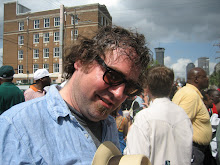I thought the dancing was great, and the staging was inventive. I especially liked that they had the band on the stage.
Then there was the book: Interracial love – it’s forbidden. This is a premise that a writer could draw enormous subtlety and nuance out of, or be completely ham-fisted, which is what this writer did.
And the music: I was very excited to see this show. Memphis in the early ’50s- The end of jump blues, the dawn of rock ‘n’ roll, what a great time in American music. The preview said not to expect the songs of Elvis or Carl Perkins, and I figured that, due to licensing complications and fees, there would be no music from that period, per se. I also read that the music was done by the keyboard player from Bon Jovi. I figured that the poor guy had cut his teeth in an ’80s pop band, but as a fervent blues scholar, he was going to mine the rich field of American music and give us original tunes in the style of that region and period. I couldn’t have been more wrong. For mass appeal, I can understand not wanting to be strictly constrained to the sound of that era. A story about Jesus sung in ancient Hebrew utilizing historically accurate modal scales would not have the same oomph or commercial appeal as Jesus Christ Superstar, but in JCSS, the music had a unifying aesthetic principle: modern rock of that time. Memphis, a musical named after a town with its own brand of blues, rock, gospel and pop, was all over the map. As hard as I tried to approach Memphis with a willing suspension of knowledge of American music history, I couldn’t help but cringe at the anachronisms and the geographical errors. “Someday” Felicia’s song, supposedly the hit of the show, considering all the play it gets, is styled after 1960s Motown. It’s like having the main tune of a musical called Detroit being a surf rock number.
I could throw all these complaints out the window if the music was undeniably great. I have a fairly sharp musical memory, and anything resembling a hook is bound to get stuck in my head. Two days after seeing Memphis, I couldn’t hum a single tune. In the end, I guess it’s fair to say the music was written by the keyboard player from Bon Jovi.
